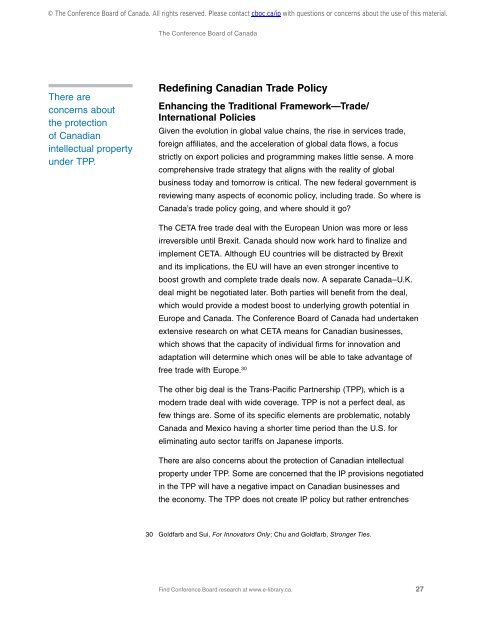Paradigm
8088-canadasnewtrade-en_rpt
8088-canadasnewtrade-en_rpt
Create successful ePaper yourself
Turn your PDF publications into a flip-book with our unique Google optimized e-Paper software.
© The Conference Board of Canada. All rights reserved. Please contact cboc.ca/ip with questions or concerns about the use of this material.<br />
The Conference Board of Canada<br />
There are<br />
concerns about<br />
the protection<br />
of Canadian<br />
intellectual property<br />
under TPP.<br />
Redefining Canadian Trade Policy<br />
Enhancing the Traditional Framework—Trade/<br />
International Policies<br />
Given the evolution in global value chains, the rise in services trade,<br />
foreign affiliates, and the acceleration of global data flows, a focus<br />
strictly on export policies and programming makes little sense. A more<br />
comprehensive trade strategy that aligns with the reality of global<br />
business today and tomorrow is critical. The new federal government is<br />
reviewing many aspects of economic policy, including trade. So where is<br />
Canada’s trade policy going, and where should it go?<br />
The CETA free trade deal with the European Union was more or less<br />
irreversible until Brexit. Canada should now work hard to finalize and<br />
implement CETA. Although EU countries will be distracted by Brexit<br />
and its implications, the EU will have an even stronger incentive to<br />
boost growth and complete trade deals now. A separate Canada–U.K.<br />
deal might be negotiated later. Both parties will benefit from the deal,<br />
which would provide a modest boost to underlying growth potential in<br />
Europe and Canada. The Conference Board of Canada had undertaken<br />
extensive research on what CETA means for Canadian businesses,<br />
which shows that the capacity of individual firms for innovation and<br />
adaptation will determine which ones will be able to take advantage of<br />
free trade with Europe. 30<br />
The other big deal is the Trans-Pacific Partnership (TPP), which is a<br />
modern trade deal with wide coverage. TPP is not a perfect deal, as<br />
few things are. Some of its specific elements are problematic, notably<br />
Canada and Mexico having a shorter time period than the U.S. for<br />
eliminating auto sector tariffs on Japanese imports.<br />
There are also concerns about the protection of Canadian intellectual<br />
property under TPP. Some are concerned that the IP provisions negotiated<br />
in the TPP will have a negative impact on Canadian businesses and<br />
the economy. The TPP does not create IP policy but rather entrenches<br />
30 Goldfarb and Sui, For Innovators Only; Chu and Goldfarb, Stronger Ties.<br />
Find Conference Board research at www.e-library.ca.<br />
27


